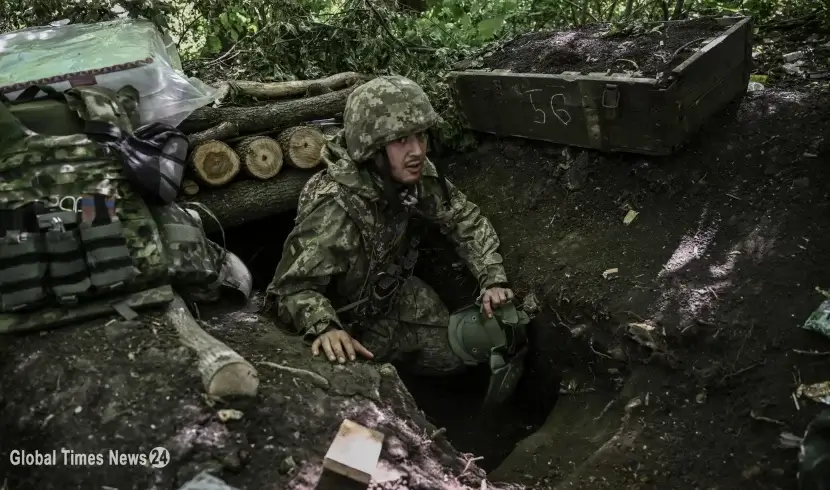Western leaders are preparing for Vladimir Putin to use “whatever tools he’s got left” including nuclear threats and cyber-attacks in response to an expected Ukrainian counter-offensive against Russia.
British officials at the G7 foreign ministers’ summit in Japan said they were expecting Russia to retaliate and “must be prepared” for extreme tactics as it attempted to hold on to Ukrainian territory.
The former Russian president Dmitry Medvedev said last month that Moscow was ready for the Ukrainians to hit back, warning that his country would use “absolutely any weapon” if Kyiv attempted to retake Crimea, which was annexed by Russia in 2014.
There appeared to be an acknowledgment in Moscow that its forces might soon find themselves on the defensive in Ukraine as Russia’s own winter offensive appeared to be slowing down.
Russia’s nuclear rhetoric has united the G7 ministers, who issued a statement after their two-hour meeting on Monday condemning the threats as “unacceptable” and criticising Putin’s plan to deploy tactical nuclear weapons in Belarus.
G7 officials said there was an “open exchange of views” in the talks on the approach to the Ukrainian conflict, including on “future prospects” for bringing the war to an end, which Rishi Sunak has said would eventually be around the negotiating table.
However, Foreign Office sources suggested that the only way to finally resolve the conflict would be for Putin to withdraw his troops from Crimea and for the west to give Kyiv the tools to finish the job.
Despite pressure from Ukraine, and others including the former UK prime minister Boris Johnson, to increase military support – including more tanks and fighter jets – the UK believes it is providing what the country needs. Sources said it was already committing its “rainy day fund”.
A transatlantic group of former senior diplomats and high-level military advisers said on Monday that the war in Ukraine was on course to become a stalemate unless the west went “all in” and increased its level of military support.
The group said that “declarations of unwavering support” were not enough and “actions still fail to match the rhetoric” in a reflection of military assessments in European capitals and Washington.
At the G7 summit, the ministers reaffirmed their commitment to “intensifying, fully coordinating and enforcing” sanctions against Russia, agreeing to be more coordinated to prevent evasion of the measures and to target third parties supplying weapons to Moscow.
It came as the foreign secretary, James Cleverly, demanded the release of a British-Russian opposition leader after he was sentenced to 25 years in prison by a court in Moscow, paying tribute to Vladimir Kara-Murza Jr for “bravely” denouncing Putin’s invasion of Ukraine.
The Kremlin critic, who has twice survived poisonings, was convicted on charges of treason and denigrating the Russian military in what he denounced as a show trial.
The Russian ambassador to the UK, Andrei Kelin, was summoned to the Foreign Office for a dressing down on Monday over Russia’s human rights obligations, including the right to a fair trial.
Meanwhile, the US secretary of state Antony Blinken’s G7 bilateral talks with his French counterpart, Catherine Colonna, over-ran, prompting speculation her talks with the US had been fraught.
The French president, Emmanuel Macron, provoked controversy last week when he said, on a flight back from China, that Europe should not become a “vassal” to the US on foreign policy.
He had previously been accused of naivety when he said Moscow must not be “humiliated” and would need security guarantees. G7 officials stressed that all member nations, including France, were united on the need to prevent Putin’s attempts to divide and conquer.
Eastern European governments, in particular, had accused Macron of failing to learn the lessons of the war. Without US military and financial support for Kyiv, more than 30 times that of France, Ukrainian resistance would have already crumbled, they believe.
In separate talks in Japan, G7 nations including UK, US, Canada, Japan and France formed an alliance to develop shared supply chains for nuclear fuel, aimed at pushing Russia out of the international nuclear energy market.
The UK’s Department for Energy Security and Net Zero said the five countries would use their civil nuclear power sectors to undermine Russia’s grip on supply chains, cutting off another means for Putin to fund his invasion of Ukraine.
News ID : 2026
 More than 200 migrant bodies recovered on Tunisian coast
World / Breaking News
More than 200 migrant bodies recovered on Tunisian coast
World / Breaking News
 Hidden poor people of oil wealth nation
World / Opinion / Breaking News
Hidden poor people of oil wealth nation
World / Opinion / Breaking News
 Pelosi Slams Netanyahu's Speech as Worst by Foreign Official in Congress
World / Breaking News
Pelosi Slams Netanyahu's Speech as Worst by Foreign Official in Congress
World / Breaking News
 Over 120 Members of Congress Boycott Netanyahu's Speech
World / Breaking News
Over 120 Members of Congress Boycott Netanyahu's Speech
World / Breaking News
 Helicopter crashes in southern Russia
World / Breaking News
Helicopter crashes in southern Russia
World / Breaking News
 Major sports events of 2022
Sport / Breaking News
Major sports events of 2022
Sport / Breaking News
 Cyber failure, an issue that has messed up Israel's intelligence
World / Opinion / Picture / Breaking News
Cyber failure, an issue that has messed up Israel's intelligence
World / Opinion / Picture / Breaking News
 Putin’s public approval soaring during the Russia-Ukraine crisis: Poll
World
Putin’s public approval soaring during the Russia-Ukraine crisis: Poll
World
 Why Nato is refusing to enforce a no-fly zone?
World
Why Nato is refusing to enforce a no-fly zone?
World
 Ukrainian forces 'holding on' as fighting rages in Severodonetsk
World
Ukrainian forces 'holding on' as fighting rages in Severodonetsk
World